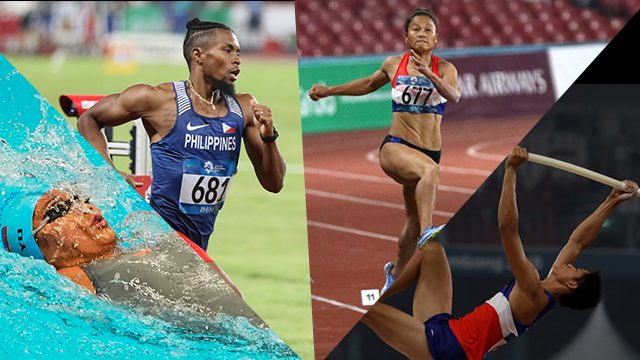SUMMARY
This is AI generated summarization, which may have errors. For context, always refer to the full article.

MANILA, Philippines – The Philippines’ 21-medal haul in the 2018 Asian Games gave a glimpse of how the country might just perform when the country hosts the Southeast Asian Games next year.
Although the Filipina athletes delivered and made up the majority of medal winners, including all of the country’s four gold medals – a big improvement from the 2014 Incheon Games where BMX rider Daniel Caluag snagged the country’s lone gold medal – there’s no hiding one concern.
As the Philippine Olympic Committee (POC) pointed out, the country again came home empty handed in medal-rich sports like athletics and aquatics.
For more than a decade, the Philippines hasn’t won a medal in both centerpiece sports. Swimming last garnered two bronzes in the 1998 Asiad while athletics last found itself on the podium in 1994 with a lone bronze medal.
“We need to perform better in athletics where there’s a lot of gold there, a lot of medals. We need to really perform better in swimming, aquatics, there’s also a lot of gold there,” said POC president Ricky Vargas.
The POC chief also wants to see the resurgence of Philippine bowling, the sport which the country used to dominate from the 1970s to the ’90s.
Before teen golfer Yuka Saso’s double-gold haul in the recent Asiad golf tournament, kegler Bong Coo also completed a twin-gold feat in the 1986 edition.
This Asian Games, though, Philippine bowling failed to send its best bet as World Cup champion Krizziah Lyn Tabora got sidelined due to an undisclosed illness.
“Bowling has always been our medal haul, and they’re just new, so they’re rebuilding, and I’ve seen the bowlers, they’re young athletes,” said Vargas.
Where is the support?
These national sports associations (NSAs) admit that they feel the pressure, but at the same time, they clamor for more financial support.
“Both swimming and athletics are the main medal-rich sports, so yes there should be pressure to at least produce more,” Philippine swimming national head coach Archimedes “Archie” Lim told Rappler.
“But at the same time, how much effort, resources, and time are we giving the sport?”
Politics has also been an issue as Philippine Swimming Inc (PSI) has been in murky waters with the aquatics community, fighting for unity with the members of the Philippine Swimming League (PSL) for many years.
“So I think the pressure is on the leaders because the athletes are doing their job,” said Lim.
Despite all the issues heading itno the Asiad, veteran Jasmine Alkhaldi and debutante Roxanne Yu gave a glimmer of hope as both emerged as the first Filipino tankers to advance to the finals after 8 years.
“We have to commend these two for actually training for and coming in to show that here in the Asian Games. I hope others see the value in that (getting into the final) and it’s not all about a medals or bust mentality,” said Lim.
Yu, who was the first to qualify for the women’s 200m backstroke final on the opening day, also agrees that there are still a lot of things to work on in the future.
“Although some may think it’s nice and grand to have that title of getting into the finals, it doesn’t really just end there,” said the 21-year-old backstroker.
Southeast Asian supremacy
Philippine Athletics Track and Field Association (PATAFA) president Philip Ella Juico is confident that the Asian Games performances of his athletes can snowball to a better SEA Games showing as the Asiad was only the start of their road to athletics dominance.
“PATAFA has been preparing for the pressure and strengthening athletes’ mental toughness started in the Asian games and can be best developed by constant exposure to high level events with good crowds,” Juico told Rappler.
“A look at the improved performances in general of our athletes in the Asiad and how they fared relative to other [Southeast Asian] nations, shows an optimistic picture for track and field in the 2019 Manila SEA Games.”
PATAFA’s star athletes experienced setbacks leading up to the 2018 Asian Games with record holders Marestella Torres-Sunang and EJ Obiena just recently recovering from injuires. Southeast Asia’s hurdles king and former sprint king Eric Cray, who’s based in the US, also had a tough Asiad preparation due to the lack of financial support.
But all these tracksters are looking forward to performing in front of the home crowd despite the pressure.
There are no final plans yet, but Philippine athletics vie to build up the program in the next 15 months.
“We have a program in place but it’s being revised and I want to ensure most of the support structures are available and functioning before duscussing details,” added Juico. – Rappler.com
Add a comment
How does this make you feel?
There are no comments yet. Add your comment to start the conversation.